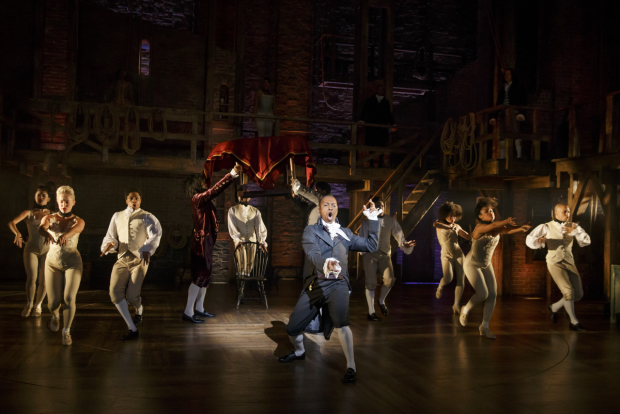
(© Joan Marcus)
“There are only two worthwhile things to leave behind when you depart this world of ours,” James Lapine writes in Sunday in the Park with George: “children and art.” With his new musical, Hamilton, Lin-Manuel Miranda has an eye on both. He’s created a work sure to be enjoyed by generations to come, proudly drawing on America’s past as a guiding light to the future. It unequivocally asserts that the revolutionary ideals of 1776 are still valid in 2015. It is nothing short of a masterpiece, destined to change Broadway forever.
Perhaps that is why Hamilton has garnered praise from audiences across the political spectrum, winning fans as ideologically disparate as Barack Obama, Dick Cheney, Hillary Clinton, and David Brooks. A runaway hit when it played downtown at The Public Theater, it now opens at Broadway’s Richard Rodgers Theatre where its unique synthesis of hip-hop and the old-fashioned book musical seems poised to draw sold-out crowds for years. In committing our history to verse, Miranda has chosen a worthy subject: Treasury Secretary Alexander Hamilton, the man who arguably forged the template for The American Dream.
One should be an immigrant to live the American Dream, as Hamilton was. In Miranda’s telling (based heavily on Ron Chernow’s acclaimed biography), Alexander Hamilton (Miranda) grows up impoverished and orphaned in the Caribbean. Through sheer cleverness and hard work he writes his ticket to a new life in New York City. He meets revolutionaries like disaffected French nobleman The Marquis de Lafayette (the sharp-tongued Daveed Diggs), abolitionist son of a slaver John Laurens (a sympathetic Anthony Ramos), and scion of Princeton Aaron Burr (Leslie Odom Jr.) — the man who would eventually kill him in a duel.
Before that fateful moment, we watch Hamilton become the favorite of General George Washington (Christopher Jackson), marry into the prominent Schuyler family, and help create a system of American finance and federalism that survives to this day. Still, he’s never quite satisfied with his accomplishments. “There’s a million things I haven’t done,” sings the man who writes like he’s “running out of time.”
Naturally, the show flies by at a frenetic pace, embodying the drive of an ambitious man in a revolutionary age. Miranda has tightened the script since its off-Broadway run, although not by fifteen minutes (as some critics have arbitrarily prescribed). Most noticeably he’s cut a scene depicting the Whiskey Rebellion, a significant chapter in the consolidation of federal power. Still, the story proceeds perfectly well without it, buoyed along by director Thomas Kail’s arresting production.
Andy Blankenbuehler has gone above and beyond the typical choreographer’s call of duty, ensuring that every object and person on the stage has its place. Bodies contort into specific images on David Korins’ set, which features one turntable placed within another. Actors and props float by, giving us a tangible sense of the passage of time, our protagonist’s most relentless foe. Paul Tazewell’s costumes lend a modern flair to period styles. Every detail and moment has been delicately crafted in this story of America’s past, told through the lens of its present.
Miranda has penned some truly memorable melodies, greatly enhanced by Alex Lacamoire’s orchestrations. Songs like “Helpless” and “Dear Theodosia” are radio-ready. The second-act tearjerker “It’s Quiet Uptown” is devastatingly beautiful. Miranda weaves musical references and recurring motifs throughout his score, reminding the listener of Les Misérables or the operas of Richard Wagner.
On top of his considerable skills as a composer, Miranda plays Hamilton with an unyielding verve. His political triumphs and personal tragedies become our own through his sympathetic portrayal of an exceptional yet deeply flawed man. As Hamilton’s saintly wife, Eliza, Phillipa Soo gives the most moving performance of the evening. Her pain is real and because of that, her forgiveness is that much more divine.
Brilliant performances abound. Odom’s narration brims with cynical insight and his songs are consistent showstoppers. For comic relief, Jonathan Groff (portraying King George III) deftly straddles the line between hilarious and psychotic, singing a grotesque brit-pop breakup song titled “You’ll Be Back.” With immaculate diction and sass for days, Renée Elise Goldsberry (playing Eliza’s older sister, Angelica) rattles off one of the show’s most unforgettable rhymes:
I’ve been reading “Common Sense” by Thomas Paine.
So men say that I’m intense or I’m insane.
You want a revolution? I wanna revelation
So listen to my declaration:
“We hold these truths to be self-evident
That all men are created equal.”
And when I meet Thomas Jefferson
I’m a compel him to include women in the sequel!
Miranda employs rap throughout, squeezing an uncommon number of syllables and ideas into each minute. While some might find this frustrating (you won’t catch all of Miranda’s ingenious wordplay in one sitting), the show’s lyrical density invites a lifetime of reexamination. As with Shakespeare, given a good production one will always discover something new and illuminating in Hamilton.
We’re certain to have that opportunity as Hamilton carries its message forth into the future, a telegram of irrepressible optimism from the Obama era. It stands in stark contrast to a rising tide of despair, most acutely expressed this year in author Ta-Nehisi Coates’ memoir Between the World and Me. In that bestselling book, Coates writes to his son, “The struggle is really all I have for you because it is the only portion of this world under your control.” Hamilton rejects that pessimism, boldly professing faith that our children will move beyond the struggles of the present and “blow us all away.”
As the young revolutionaries of Hamilton sing, “Tomorrow there’ll be more of us.” Such implacable faith in our posterity is not naive, nor is it musical schmaltz: It’s the bedrock of the entire American experiment.











